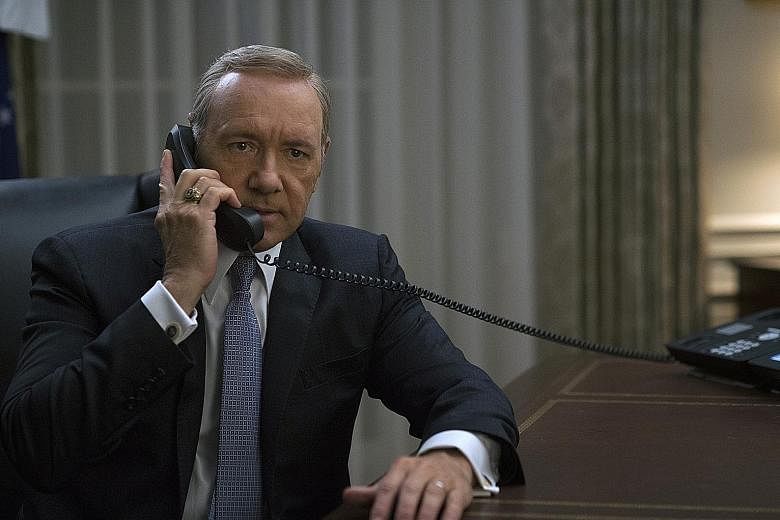In its fourth season, House Of Cards continues to be the smartly dressed love child of a prestige drama and a campy soap opera.
The mixed parentage is still working in its favour: The show that launched binge-watching is as bingeable as ever, returning from a somewhat dreary and static third season to one where heaps are going on for its anti-hero - scheming politician Frank Underwood (Kevin Spacey) - including a presidential election and the mother of all marital spats.
Yet, for the first time, the series has direct competition in the form of an even wilder political drama playing out off-screen: the presidential nomination battle pitting Democratic frontrunner Hillary Clinton against Bernie Sanders, and Donald Trump against a befuddled Republican field.
Next to the unscripted absurdities offered up by Trump and others, the battles in this season's House Of Cards - a universe where a high-level congressman conspires to steal the United States presidency and kills a reporter by shoving her in front of a train - seem less far-fetched than before.
The electoral challenges facing Underwood this season pale in comparison to the lunacy of what is shaping up as the most unpredictable US election race in a generation.
Sure, Underwood must outmanoeuvre Democratic front runner Heather Dunbar (Elizabeth Marvel), the handsome Republican nominee, Will Conway (Joel Kinnaman), plus a disgruntled Lady Macbeth, his wife Claire (Robin Wright) - but at least he does not have to deal with a former reality TV star and billionaire demagogue whose ascendancy continues to confound everyone.
-
HOUSE OF CARDS SEASON 4
-
RTL CBS Entertainment (HD) (StarHub TV Channel 509, Singtel TV Channel 318)
Tuesday, 9.55pm
3/5 stars
Despite this pesky distraction of truth being stranger than fiction, the key elements of the show's hybrid DNA are still efficiently ticking away.
Maintaining the prestige factor are the Shakespearean overtones of the Underwoods' delectable machinations, although Frank's signature asides to the camera are more scattershot this time and often seem non-essential.
Led by two-time Oscar winner Spacey, the able cast turn in understated performances far more credible than the crazy plot twists, which gels with the restrained look and tone set out by director David Fincher (Gone Girl, 2014) at the beginning of Season One.
The myriad references to the complexities of politics are back too, although - in a pattern the series established early on - they avoid going into the sort of wonkish detail that The West Wing delighted in, the result here being to flatter the viewer's intelligence without challenging it too much.
The writers thus glibly finesse the details of arcs such as the Underwoods' supposedly brilliant diplomatic solution to the oil crisis and Russian bailout, which are principally there to demonstrate the couple's charisma and cunning and give the viewer something to cheer for.
As it has been for a while, plausibility is secondary. The show knows it is the interpersonal machinations - rather than any incisive geopolitical analysis or carefully crafted satire - that keep most people coming back for more.
Marks must be given, however, for the show's occasional ability to foreshadow real-life developments.
This season, it is a Ku Klux Klan scandal involving one of the candidates, although, unlike Trump, he had the good sense to immediately disavow any connection to the hate group.
There are attempts to nudge real issues too, as with a subplot involving the use of search-engine data to manipulate the electorate and target voters, which hints at the poorly understood dangers of "big data".
Yet, the series merely grazes the subject, which has been more imaginatively explored by shows such as The Good Wife.
The show is far more willing to push boundaries in exploring the psychology of power, whether in the endlessly fertile ground of the Underwoods' Clintonesque partnership or the marriage of the rival Conways, with their Instagram-perfect family and Kardashian levels of selfie-taking.
Is either a believable portrait of a political power couple? Few of the show's dramatic flourishes seem anchored in reality.
It is pretty entertaining, of course, but once again, this is no finely etched portrait of politics or its impact on relationships.
For that, you are better off trying to get your hands on a box set of Borgen (2010-2013), the outstanding Danish political drama about politician Birgitte Nyborg (Sidse Babett Knudsen), as she becomes Denmark's first female Prime Minister.
There are no death-by-train theatrics here, just a smart, sensitive portrayal of the vagaries of political life and the personal fallout for those involved, from Nyborg and her family to her spin doctor and the journalists who write about them.
This is Scandinavia, though, so instead of the corridors of power in Washington D.C., you see things such as Prime Minister Nyborg doing her own dishes or riding a bicycle to her offices in Parliament.
However, under this modest packaging is a political series that is not just bingeable, but also binge-worthy and more so than House Of Cards.


